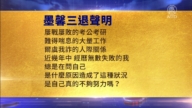【新唐人2011年6月1日讯】在用电量的淡季,中国十几个省市却面临严重“电荒”,各地相继采取限电和让电措施。中国电力企业联合会预估,今年夏天缺电比较严重的会是东部、中部及东北地区,而明年,中国全国的供电会更加紧张,缺口可能进一步扩大。不过,“电荒”给电力利益集团提供涨价的借口,用电比例较小的百姓民生用电,同样受到波及。
国家电监会副主任俞燕山向《财经国家周刊》的记者表示:从青海、湖北、湖南等传统缺煤的省份,到山西、陕西、河南等传统产煤大省,都出现发电厂“缺煤停机”的现象,他说,这恐怕是7年来最严重的“电荒”。
按照电力行业的说法,“电荒”是因为煤价高,电价低,电厂发电越多越亏钱,因此选择消极怠工。
根据中国电力企业联合会(中电联)的统计,今年1到4月,华能、大唐、华电、国电、中电投等五大发电集团,因煤价上涨等原因,造成火电亏损100多亿元人民币。小规模的地方电厂也因为亏损严重而“停工检修”。
中国煤炭运销协会能源专家李朝林接受《希望之声电台》采访时表示,“电荒”发生的关键原因是:电力市场化改革不够。
中国煤炭运销协会能源专家李朝林:“现在煤炭供应紧张,一个煤价上涨,成本提高,再就是说电力市场化改革也不够,现在都是吃国家大锅饭,电网啊利润是不是赚的太多了,他的上网电价两毛多、三毛多钱嘛,送电成本是不是也偏高? ”
《经济观察报》批评,小规模的民间电厂的确可能因不堪成本负荷而停工,但国有发电企业应该以保障民生经济为优先,而不是以营利为主。可是这一波“电荒”,国企也跟着“停工检修”,造成广大民生用电问题。
报导指出,十多年来在中共政府主导下,国有企业以国有垄断的模式快速膨胀。不过,从中石油叫嚷国内油价偏低,到这一波电力企业在淡季“配合电荒”,加上中共官方的“纵容”。苦的只是老百姓。
中国能源网专家顾问甘世宣:“以煤为主的这样一个电源结构里头,如果电煤的矛盾很突出,主要还是要从改革上解决电煤这个问题,现在煤炭是市场定价,电是国家控制,国家定价,可我看消息是,几十个省可能陆续里要调电价。老百姓用的电在整个行业里头占比例很小,民用电只是占百分十几,主要在重工业上。”
另外,《经济观察报》认为,“电荒”也会造成通胀更加严重。因为发改委如果拒绝提高电价,等夏季用电高峰期一到,“电荒”可能更严重,更多地区和企业被拉闸限电,民生用品产量下滑,大部分产品必然涨价,等于间接推高通胀压力。而就算发改委提高电价,虽然减少了电力公司的亏损,但也直接推高了通胀问题。
报导说,如果市场经济仍然是中国决策者奉行的基本准则,对国企大刀阔斧式的改革则势在必行。美国有500家电网企业,人均用电量是中国的六倍,却从未出现过电荒。这个事实告诉我们,并不是国有垄断企业才能保障一个国家的能源安全。
新唐人记者曾耀贤、薛莉综合报导。
“Power Shortage” Intensified by State-owned Plants
“Power Shortage” Intensified by State-owned Plants
In this off-peak season, over 10 provinces and cities
in China are facing power shortages, power cuts, and
blackouts. China Electricity Council predicted that
China’s east, middle, and northeast areas will be the
hardest-hit this summer, and shortages could increase
next year. The “power shortage” gives electric power
companies an excuse to raise their prices,
which in turn affects people’s daily power consumption.
Yu Yanshan, Deputy Director of the State Electricity
Regulatory Commission, told the National Economic
Weekly: “From coal-deficient provinces like Qinghai,
Hubei, and Hunan to coal-producing provinces like
Shanxi, Shanxi, and Henan, many other power plants
have shut down due to the ‘lack of coal’.”
It is the worst ‘power shortage’ in seven years.”
According to power industry sources, the so-called
“power shortage” exists not because coal is expensive
but because electricity is cheap. Plants are losing
money when they produce power, so they shut down.
According to China Electricity Council’s statistics,
from January to April, five power groups including
Huaneng, Datang, Huadian, Guodian, and China
Power Investment, lost over $1.54 billion, due to
Coal’s skyrocketing prices. Many small power plants
have also “shut down” after facing heavy losses.
Li Chaolin, an energy expert from the China Coal
Transportation and Marketing Association, told
Sound of Hope, “The ‘power shortage’ is due to
Electricity’s imbalanced market-oriented reform.”
Li Chaolin, an energy expert, said: “The present ‘coal
Shortage’ is due to high prices and high mining costs,
as well as electricity’s imbalanced market-oriented
reform. Electrical power groups don’t feel responsible
to society. They only care about making huge profits,
with an on-grid price of $.03 per kilowatt-hour and
a high-transfer power cost.”
The Economic Observer reported that small plants
might need to shut down due to heavy losses,
but state-owned power groups should focus on their
employees’ livelihood, instead of making a profit.
However, during this “power shortage,” state-owned
plants also shut down, affecting people’s daily lives.
According to the report, state-owned power plants,
which have dominated the market for the past 10 years,
have quickly expanded into nationalized monopolies.
But civilians are still suffering. PetroChina is now
complaining about petro prices being too low.
The current “power shortage” is being intensified by
state-owned plants and the CCP’s collusion.
Gan Shixuan (an expert from China Energy Net) said:
“In a coal-based power system, if the imbalance
between coal and electricity is significant, then reform
must take place. At present, the price of coal is set by
market value, while the price of electricity is
controlled by the CCP. But what I see is that over
10 provinces will raise their price of electricity.
Power usage in people’s daily lives accounts for
10 percent of the total electricity used in China, while
industries account for 90 percent of the electricity used.”
According to the Economic Observer, the current
“power shortage” will cause inflation to rise. If the
Development and Reform Commission (DRC) refuses
to raise power prices, this “shortage” could worsen in
the summer, during the peak season. Power will be cut
for more and more industries, resulting in decreased
production and higher commodity prices, which will
indirectly cause inflation to rise. But if the DRC raises
electricity prices, although the power plants will be less
burdened, inflation is sure to rise.
According to the report, if the CCP insists on
fostering a market economy, then a drastic reform
in the way state-owned businesses operate is needed.
The U.S. has about 500 power grid companies and its
electricity consumption, per capita, is five times
higher than China. Yet, it never experiences shortages.
This tells us that state-owned monopolies are not the
only way to guarantee a nation’s energy security.
NTD reporters Zeng Yaoxian and Xue Li




























